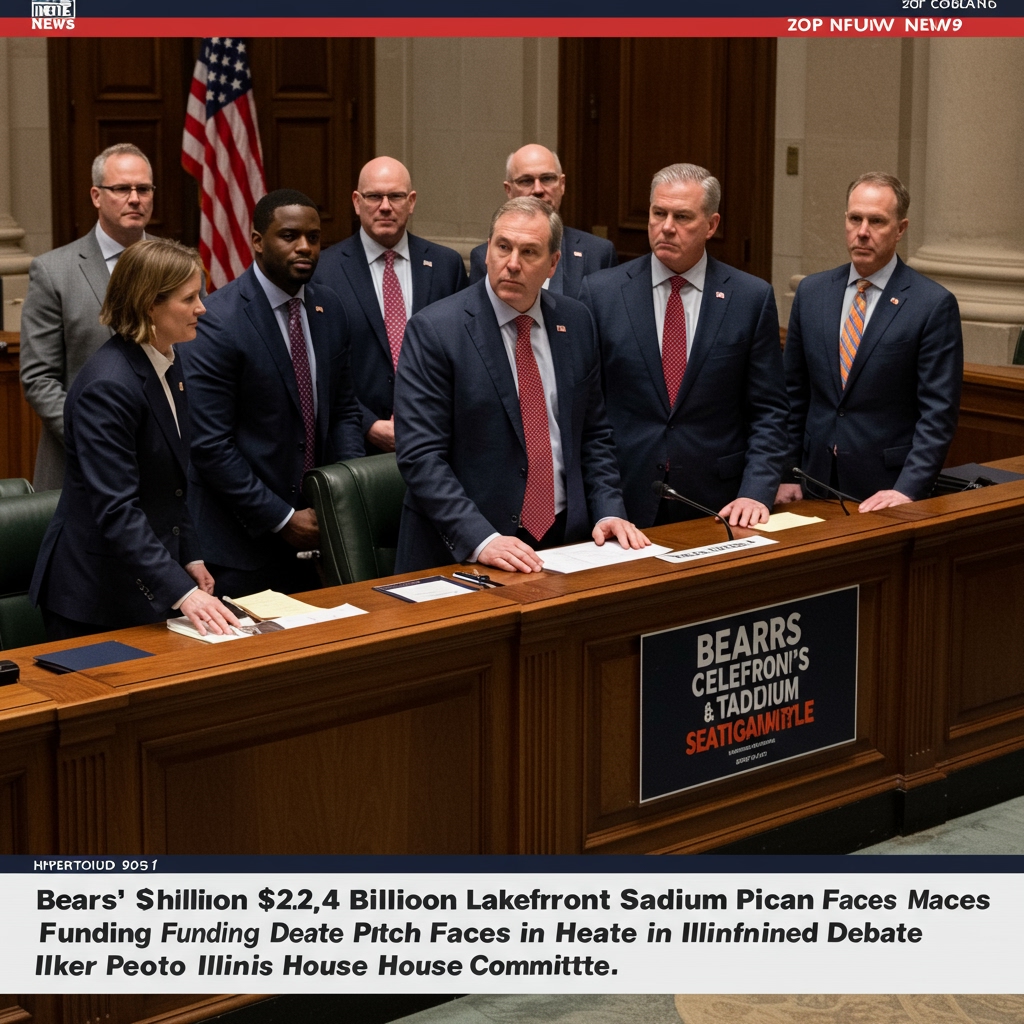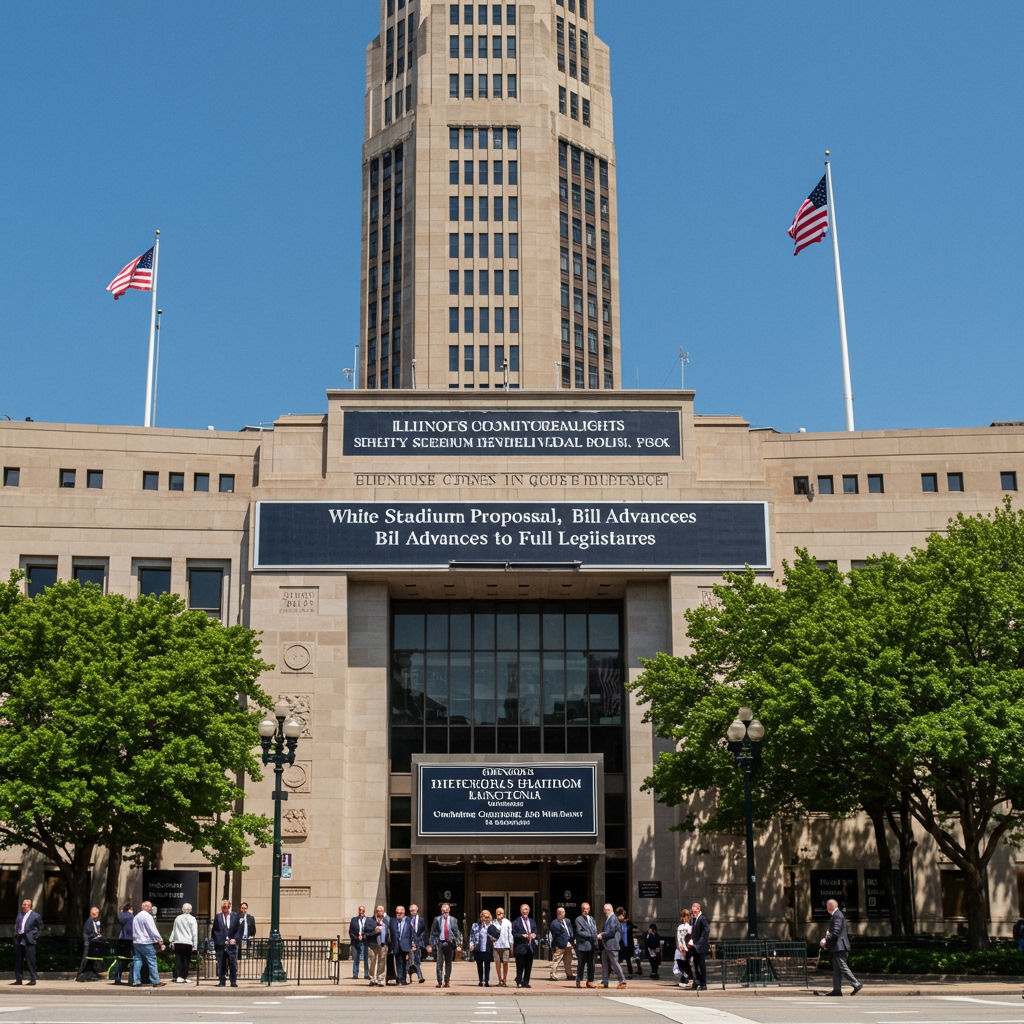SPRINGFIELD, IL – A pivotal moment in the Chicago Bears’ quest for a new stadium unfolded “today” as a key committee within the Illinois House of Representatives convened a crucial hearing to dissect the team’s ambitious proposal seeking substantial public financial support. At the heart of the discussion is the Bears’ plan for a sprawling $4.7 billion enclosed stadium complex situated on the iconic lakefront near Soldier Field, a project they contend requires a significant commitment of state and city resources.
The Bears’ Bold Proposal and Public Ask
The Chicago Bears ownership group has laid out a vision extending far beyond a simple stadium. Their proposal encompasses a modern, enclosed facility designed for year-round events, significant park space development surrounding the venue, and critical infrastructure upgrades aimed at improving transportation access and public amenities in the area. The total estimated cost of this transformative project stands at a staggering $4.7 billion. While the Bears have pledged to contribute a substantial portion, they are seeking approximately $2.4 billion in direct and indirect contributions from state and city taxpayers. This request, roughly half the total project cost, includes potential bond issuances and other public financing mechanisms that would require legislative approval.
Committee Room Confrontation: Arguments For and Against
The hearing, held before the designated Illinois House Committee, became a forum for sharply contrasting viewpoints on the merits and risks of committing such a considerable amount of public money to a private professional sports franchise. Proponents of the plan, including representatives from the Bears organization and allied groups, emphasized the potential for significant economic benefits. They argued that the new stadium and surrounding development would serve as a powerful engine for job creation, both during construction and through ongoing operations. Furthermore, they highlighted the potential to attract major events beyond NFL games, such as concerts, conventions, and even potential future Super Bowls or NCAA championships, thereby boosting tourism revenue and enhancing Chicago’s status as a premier destination. The proposed park space and infrastructure improvements were also touted as valuable public assets that would enhance the lakefront experience for all residents and visitors.
However, the proposal met with fervent opposition from a diverse group of critics, including taxpayer advocacy organizations, community activists, and some elected officials. Their primary concern revolved around the use of taxpayer money – funds they argued could be better allocated to pressing public needs such as education, healthcare, transportation infrastructure across the state, or addressing the state’s ongoing budget challenges. Opponents raised pointed questions about the financial assumptions underpinning the Bears’ economic projections, citing studies that often show public funding for sports stadiums yields limited or negative returns on investment for the broader community when compared to the magnitude of the public subsidy. Concerns were also voiced about the potential economic risks associated with guaranteeing or backstopping bonds for a private entity, placing the financial burden on taxpayers if revenues fall short of projections. The debate also touched upon the aesthetic and public access implications of constructing a large, enclosed structure on the historically protected lakefront near Soldier Field, a sensitive area governed by strict development rules.
Testimony and Deliberation
The hearing featured testimony from a range of witnesses, each presenting their analysis and perspective on the complex financial, economic, and social implications of the project. Committee members engaged in rigorous questioning, seeking clarity on the financial models, projected revenues, the nature of the public vs. private contributions, and the proposed mechanisms for repayment of publicly funded bonds. The discussion underscored the deep divisions within the state legislature and among the public regarding the appropriateness of using significant public funds for private stadium projects, a debate that has played out in various forms across the country. The committee members listened intently, grappling with the balance between potential economic development promises and the inherent risks and opportunity costs associated with deploying substantial public capital.
No Immediate Vote, Debate Continues
Despite the extensive hearing and the robust exchange of arguments, the Illinois House Committee did not take a vote on the measure “today”. This decision indicates that lawmakers require additional time to consider the complex details of the proposal, the feedback received during testimony, and the broader implications for the state’s finances. The committee’s decision to postpone a vote but commit to revisiting the proposal pushes the highly debated plan further along the legislative process, bringing it closer to a potential full floor debate before the entire House of Representatives. The path forward remains uncertain, but “next week” is expected to bring further legislative action on the Bears’ ambitious, and controversial, lakefront stadium funding request.














